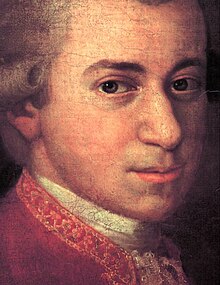Zaide
| Zaide | |
|---|---|
| Opera by W. A. Mozart | |

The composer around 1780, detail of a painting by J. N. d. Croce
|
|
| Description | unfinished project of 1780 |
| Librettist | Johann Andreas Schachtner |
| Language | German |
Zaide (originally, Das Serail) is an unfinished German-language opera, K. 344, written by Wolfgang Amadeus Mozart in 1780. Emperor Joseph II, in 1778, was in the process of setting up an opera company for the purpose of performing German opera. One condition required of the composer to join this company was that he should write a comic opera. At Salzburg in 1779 Mozart began work on a new opera (now known as Zaide although Mozart did not give it such a title). It contains spoken dialogue, which also classifies it as a Singspiel (literally, "singing play"). Only the arias and ensembles from the first two acts were composed. Missing are an overture and third act.
It was popular at the time for operas to depict the rescue of enslaved Westerners from Muslim courts, since Muslim pirates were preying on Mediterranean shipping, particularly to obtain slaves for various purposes. This story portrays Zaide's effort to save her beloved, Gomatz.
Mozart was composing for a German libretto by Johann Andreas Schachtner, set in Turkey, which was the scene of his next, completed rescue Singspiel (Die Entführung aus dem Serail). He soon abandoned Zaide, to work on Idomeneo, and never returned to the project. The work was lost until after his death, when Constanze Mozart, his wife, found it in his scattered manuscripts in 1799. The fragments wouldn't be published until 1838, and its first performance was held in Frankfurt on January 27, 1866, the 110th anniversary of Mozart's birth. Zaide has since been said to be the foundations of a masterpiece, and received critical acclaim. The tender soprano air, "Ruhe sanft, mein holdes Leben" is the only number that might be called moderately familiar.
The title Zaide was supplied by the Mozart researcher Johann Anton André, who first published the score, including his own completion of it, in the 1830s. André's father Johann André had set the same text to music, before Mozart commenced his singspiel.
...
Wikipedia
